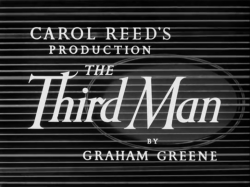by NEIL SINYARD
 To commemorate the 70th anniversary of the release of Carol Reed’s The Third Man and the 20th anniversary of its being voted the best British film of the century in a British Film Institute poll, I want to offer some reflections on the film and particularly on the character of Harry Lime, who, as played by Orson Welles, is assuredly one of the cinema’s most charismatic villains. A remarkable aspect of Lime’s cinematic durability is that he is only on screen for around 8 minutes or so. My focus will be on those scenes in which he appears and the reasons for their impact. To begin with, however, I wish to ruminate on one of his most striking features: his name.
To commemorate the 70th anniversary of the release of Carol Reed’s The Third Man and the 20th anniversary of its being voted the best British film of the century in a British Film Institute poll, I want to offer some reflections on the film and particularly on the character of Harry Lime, who, as played by Orson Welles, is assuredly one of the cinema’s most charismatic villains. A remarkable aspect of Lime’s cinematic durability is that he is only on screen for around 8 minutes or so. My focus will be on those scenes in which he appears and the reasons for their impact. To begin with, however, I wish to ruminate on one of his most striking features: his name.
What’s in a name?
 In Ways of Escape, Graham Greene mentioned some of the symbolic interpretations which had been offered about the names of the two main characters of his screenplay, Harry Lime and Holly Martins: for example, how the former had been linked to the lime tree in Sir James Frazer’s classic study of pagan mythology, The Golden Bough (1922), and how Holly was clearly associated with Christmas, so symbolically they represented a clash between paganism and Christianity. Greene could offer a much simpler explanation for what he had in mind:
In Ways of Escape, Graham Greene mentioned some of the symbolic interpretations which had been offered about the names of the two main characters of his screenplay, Harry Lime and Holly Martins: for example, how the former had been linked to the lime tree in Sir James Frazer’s classic study of pagan mythology, The Golden Bough (1922), and how Holly was clearly associated with Christmas, so symbolically they represented a clash between paganism and Christianity. Greene could offer a much simpler explanation for what he had in mind:
The truth is I wanted for my ‘villain’ a name natural and yet disagreeable, and to me Lime represented the quicklime in which murderers were said to be buried. As for Holly, it was because my first choice of name Rollo had not met with the approval of Joseph Cotten. So much for symbols.1
 However, it is worth noting that a character’s name in The Third Man, like his or her nationality, is a very slippery business in what is an extremely slippery film (in terms of its narrative development, its camera style, and even its streets, which seem to gleam with wetness although it never rains). Holly was originally Rollo but is sometimes called Harry by Anna Schmidt (Alida Valli), who is supposedly Austrian but is actually Czech, so one could surmise that Schmidt is not her real name.
However, it is worth noting that a character’s name in The Third Man, like his or her nationality, is a very slippery business in what is an extremely slippery film (in terms of its narrative development, its camera style, and even its streets, which seem to gleam with wetness although it never rains). Holly was originally Rollo but is sometimes called Harry by Anna Schmidt (Alida Valli), who is supposedly Austrian but is actually Czech, so one could surmise that Schmidt is not her real name.
Graham Greene, Ways of Escape (Penguin, 1980), pp. 181-182. ↩
